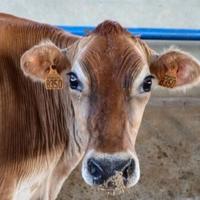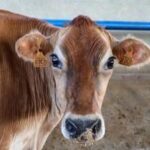There is a different atmosphere on Najmeddine Tantoun’s farm on the outskirts of Misrata, where the usual hum of dairy milking machines has been replaced by near silence. Due to an outbreak of foot-and-mouth disease, almost half of his cows have been lost to this highly contagious illness affecting hoofed animals.
This outbreak has had devastating effects on cattle farmers in Libya, as they struggle to obtain vaccines for their animals, impacting both dairy and meat production. Despite Libya’s reliance on oil revenue, Misrata is a key dairy center that used to produce 70,000 liters of milk daily. However, this output has now decreased to only 20,000 liters per day, according to Salem al-Badri, head of the city’s committee of cattle farmers.
At 27 years old, Tantoun expressed his concerns about the future, stating, “the future looks bleak” and sharing the devastating loss of around 300 of his 742 cows due to the disease.
The disease primarily targets ruminant livestock like cattle, sheep, and goats, causing symptoms such as fever, blisters, and sometimes death.
– ‘Heading towards a catastrophe’ –
In Misrata, some farmers have reported losing up to 70 percent of their cattle to the disease, as confirmed by Badri’s committee. Badri warned of an impending catastrophe, emphasizing the urgent need for vaccines to control the epidemic.
The disease has not only affected cattle farmers but has also caused financial strain on consumers due to meat and dairy shortages. Additionally, the presence of another cattle ailment called lumpy skin disease has raised concerns among foreign buyers importing Libyan cowhide.
Amidst the ongoing challenges, farmers in Misrata blame the authorities for not implementing necessary safety measures and delaying their response during the outbreak, resulting in crucial vaccine delays to affected regions.
Badri criticized the delayed vaccine delivery, stating that timely intervention could have prevented the current crisis. He highlighted the importance of providing vaccines promptly to protect farms and livestock.
– ‘Economic disaster’ –
Authorities in both eastern and western Libya have initiated emergency vaccination plans with support from organizations like the UN Food and Agriculture Organization. However, some farmers believe these responses were often too late, leading to filed lawsuits and calls for stricter control over animal imports and disease reporting.
With their livelihoods at stake, farmers like Tantoun are seeking support from local authorities to provide necessary vaccines and compensate those affected by the disease. As the future remains uncertain, some farmers, like Ali Ghabag, have decided to abandon cattle farming altogether out of fear and uncertainty surrounding the crisis.
Ultimately, the current situation in Misrata highlights the urgent need for coordinated efforts to address livestock diseases, safeguard farming communities, and ensure sustainable agricultural practices for the future.





